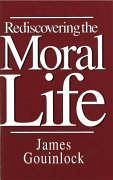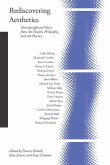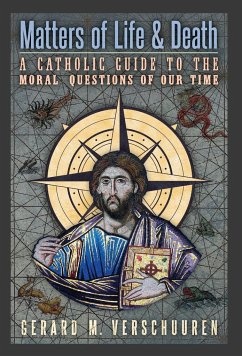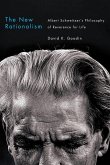He presents the problems of fact and value in a new and vivid light while giving moral discourse original and refreshingly constructive attention. In addition, there is penetrating analysis of the origins of moral values in the conditions of the moral life. Drawing from research in the behavioural sciences, Gouinlock points out the multiple uses of knowledge of human nature in moral reflection and action. He then sets forth the nature of the virtues that are most suitable for contending with these generic conditions. Throughout, Gouinlock draws upon many sources of wisdom in the history of philosophy while laying bare the futilities of contemporary theories. With courage and candour Gouinlock confronts the nature of the moral life and its prospects for both suffering and fulfilment. "Rediscovering the Moral Life" stands in the great tradition of synoptic works in philosophy that have the boldness to challenge prevailing academic conventions and the insight to reveal the best lessons of moral experience.
Periodically, someone must remind philosophers of just how far removed they are from the all-too-real and vital human concerns that affect people's lives. Someone has to point the way to a philosophy that returns to these concerns with both depth and realism. James Gouinlock has deftly accomplished both tasks in Rediscovering the Moral Life. With trenchant reference to such contemporary philosophical luminaries as Alasdair MacIntyre, John Rawls, Jurgen Habermas, Michael Walzer, and Richard Rorty (among others), Gouinlock demonstrates that the abstractions produced by these writers fail to engage the very subject matter that gives pertinence to ethical theory and offers direction to moral conduct. Gouinlock shows how current thinkers produce elaborate but lifeless and impractical conceptual schemes devoid of meaning for those of us who live in the real world. Of vital importance is the moral life itself: the actual values, conflicts, ambiguities, and resources resident in human life. Here we find the sources of moral direction and aspiration. With learning, wit, and lively analysis Gouinlock carries out the project of discerning and appropriating these resources, and in so doing returns philosophy to the fundamental character of human perplexities and ambitions. Only in reference to the conditions of ordinary everyday living - with all of its confusion, frustration, and anxiety - can philosophy regain the vitality and pertinence to rescue it from the ivory tower. The ideas from that tiresome tower oscillate between forms of absolutism and relativism. Finding no warrant for either in the moral life itself, Gouinlock presents a moral pluralism, warranted by the very nature of the morallife and implemented not by invariant rules, but by remarkably simple and effective virtues determined in reference to the moral condition. Although they cannot give absolute certification to moral judgment, the virtues provide a foundation for thought and action in real circumstances. Gouinlock begins his discussion by presenting some of the most fateful traits of existence, from which he proceeds to more specific analyses. He presents the problems of fact and value in a new and vivid light while giving moral discourse original and refreshingly constructive attention. In addition, there is penetrating analysis of the origins of moral values in the conditions of the moral life. Drawing from research in the behavioral sciences, Gouinlock points out the multiple uses of knowledge of human nature in moral reflection and action. He then sets forth the nature of the virtues that are most suitable for contending with these generic conditions. Throughout, Gouinlock draws upon many sources of wisdom in the history of philosophy while laying bare the futilities of contemporary theories. With courage and candor Gouinlock confronts the nature of the moral life and its prospects for both suffering and fulfillment. Rediscovering the Moral Life stands in the great tradition of synoptic works in philosophy that have the boldness to challenge prevailing academic conventions and the insight to reveal the best lessons of moral experience.
Hinweis: Dieser Artikel kann nur an eine deutsche Lieferadresse ausgeliefert werden.
Periodically, someone must remind philosophers of just how far removed they are from the all-too-real and vital human concerns that affect people's lives. Someone has to point the way to a philosophy that returns to these concerns with both depth and realism. James Gouinlock has deftly accomplished both tasks in Rediscovering the Moral Life. With trenchant reference to such contemporary philosophical luminaries as Alasdair MacIntyre, John Rawls, Jurgen Habermas, Michael Walzer, and Richard Rorty (among others), Gouinlock demonstrates that the abstractions produced by these writers fail to engage the very subject matter that gives pertinence to ethical theory and offers direction to moral conduct. Gouinlock shows how current thinkers produce elaborate but lifeless and impractical conceptual schemes devoid of meaning for those of us who live in the real world. Of vital importance is the moral life itself: the actual values, conflicts, ambiguities, and resources resident in human life. Here we find the sources of moral direction and aspiration. With learning, wit, and lively analysis Gouinlock carries out the project of discerning and appropriating these resources, and in so doing returns philosophy to the fundamental character of human perplexities and ambitions. Only in reference to the conditions of ordinary everyday living - with all of its confusion, frustration, and anxiety - can philosophy regain the vitality and pertinence to rescue it from the ivory tower. The ideas from that tiresome tower oscillate between forms of absolutism and relativism. Finding no warrant for either in the moral life itself, Gouinlock presents a moral pluralism, warranted by the very nature of the morallife and implemented not by invariant rules, but by remarkably simple and effective virtues determined in reference to the moral condition. Although they cannot give absolute certification to moral judgment, the virtues provide a foundation for thought and action in real circumstances. Gouinlock begins his discussion by presenting some of the most fateful traits of existence, from which he proceeds to more specific analyses. He presents the problems of fact and value in a new and vivid light while giving moral discourse original and refreshingly constructive attention. In addition, there is penetrating analysis of the origins of moral values in the conditions of the moral life. Drawing from research in the behavioral sciences, Gouinlock points out the multiple uses of knowledge of human nature in moral reflection and action. He then sets forth the nature of the virtues that are most suitable for contending with these generic conditions. Throughout, Gouinlock draws upon many sources of wisdom in the history of philosophy while laying bare the futilities of contemporary theories. With courage and candor Gouinlock confronts the nature of the moral life and its prospects for both suffering and fulfillment. Rediscovering the Moral Life stands in the great tradition of synoptic works in philosophy that have the boldness to challenge prevailing academic conventions and the insight to reveal the best lessons of moral experience.
Hinweis: Dieser Artikel kann nur an eine deutsche Lieferadresse ausgeliefert werden.








